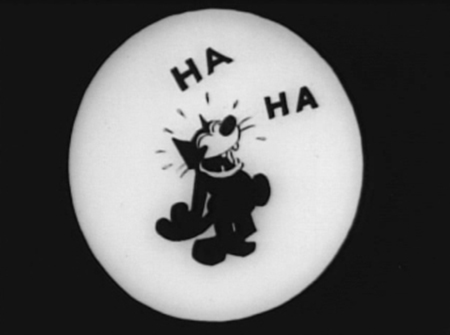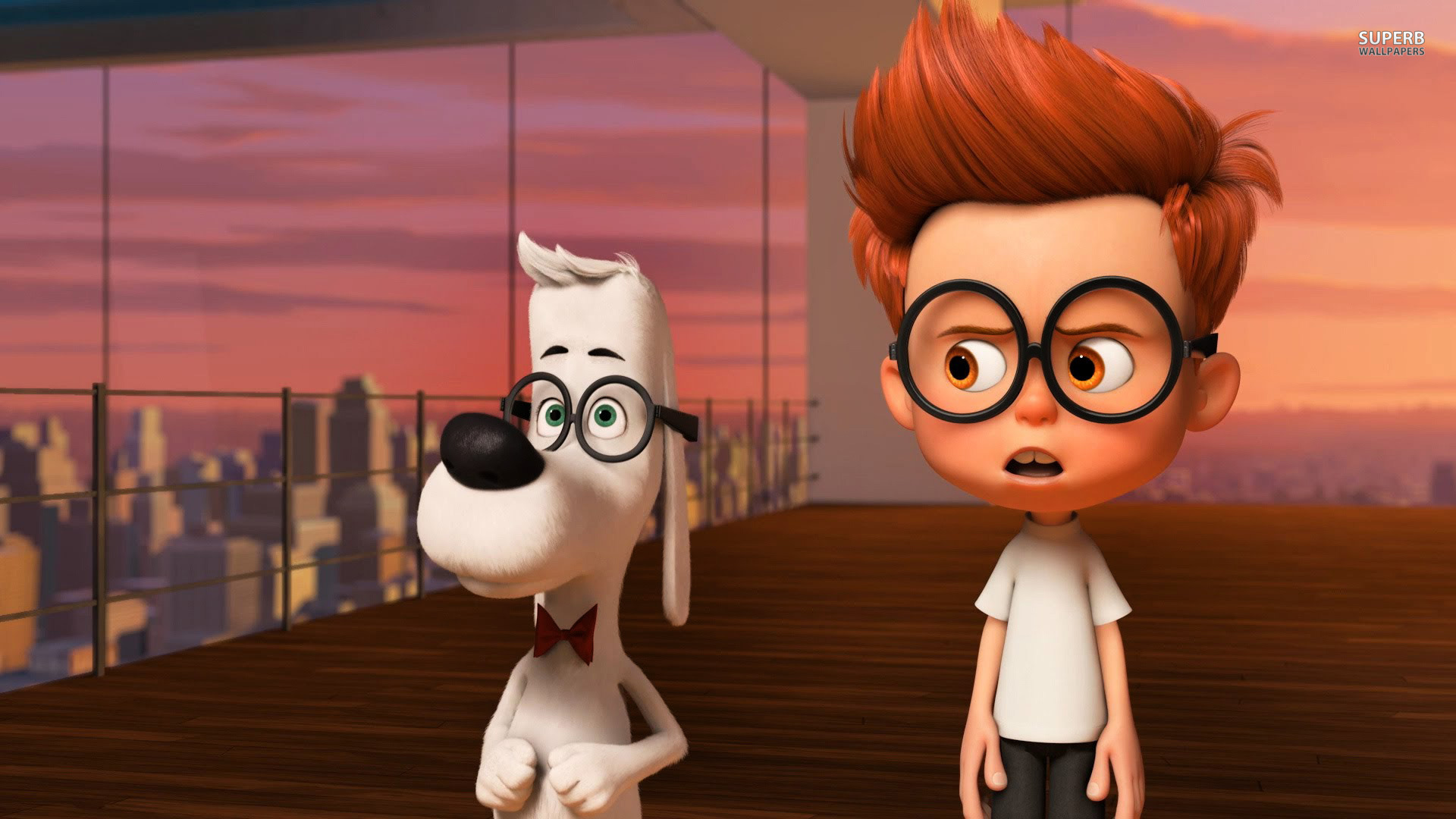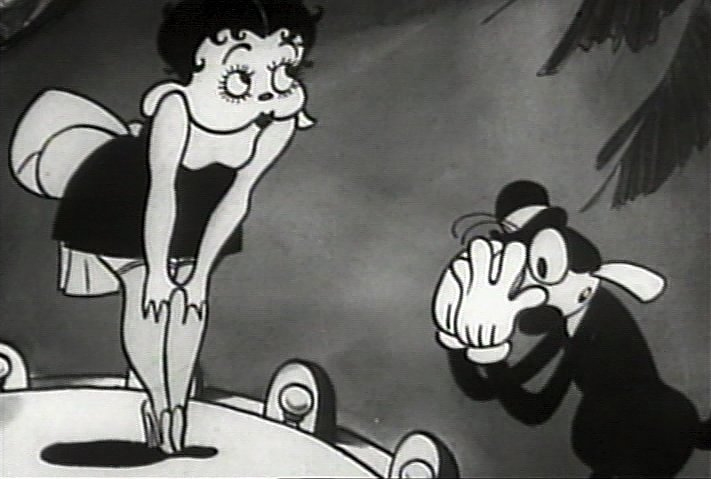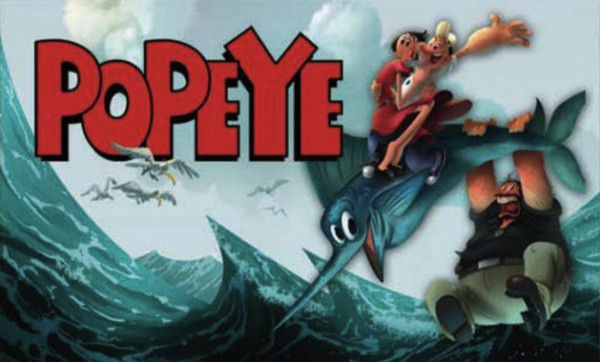Tim's Toons: Thoughts on animation's new reboot fever
 Thursday, June 19, 2014 at 11:15PM
Thursday, June 19, 2014 at 11:15PM Tim here. It’s been a weird week for fans of old animation. Nathaniel already said his piece (which is indistinguishable from mine) on the news that Warner is re-rebooting Scooby-Doo a mere 12 years after the first grisly first live-action/animated reboot of the ‘70s cartoon (the recent death of Casey Kasem, mere days before the announcement, now looms as some sort of grim karmic metaphor). And in the last couple of days, we’ve been hit with the first promotional artwork for an in-development Popeye feature at Sony Animation, and the news that DreamWorks has purchased the rights to Felix the Cat from the family of the 95-year-old slapstick animal’s creator.
At least Sony’s Popeye is in the hands of Genndy Tartakovsky, one of the few brand-name animation directors in the world today with a real visual flair and sense of the medium’s possibility, the wretched script for his sole feature to date, Hotel Transylvania, notwithstanding. But there’s something both depressing and disquieting about seeing all of these icons and not-such-icons being snapped up by big studios (though it’s better than what Disney’s doing with Into the Woods: taking the guts out of somebody else’s story to protect the brand viability of the fairy tale characters over whom it wants to declare complete ownership).
It’s frustratingly lazy: an admission that everybody is more concerned with marketability and branding than creativity – both the Popeye and Felix news happened at a thing called Licensing Expo – and it’s easier to absorb the wonderful characters made by long-dead artists than to encourage today’s animators to use the resources of a big studio to come up with new characters on that level themselves. Because these were big studio projects, back in the day: Felix was one of the big movie stars of the ‘20s, popular at a level that the $1 billion-grossing Frozen couldn’t even compete with.

But this isn’t just a rant about the lack of creativity in modern animation, and it’s not going to be a rant about how They can’t treat old characters with respect (if I can survive the knowledge that the studio behind Ice Age: Sometimes with Dinosaurs, Other Times with Pirates is going to have its way with Charlie Brown and Snoopy in 2015, nothing that Sony might do with Popeye can phase me). It’s not even a rant at all, but a fear: this isn’t just symptomatic of normal healthy, Hollywood corporate thinking, where commercial viability is more important than art. That’s been going on since Felix was around the first time. It’s coming from a weird, dysfunctional place where the executives in charge of spending money to make these films don’t seem to understand why they’re doing it in the first place.
Because buying brand names is one thing – the 2015 Peanuts movie and the new Scooby-Doo are cash grabs, but explicable ones. But for all that most people recognize Popeye the Sailor as an iconic figure, it’s hard to say that there’s much of an audience around these days for the extreme grotesquerie of the character designs and the surrealist humor (if they’re following the original comics) or the violence and gender archaism (if they’re following the ‘30s cartoons) that are so inextricably linked to the property that to change them would mean ignoring everything but character names. And poor Felix, I don’t even think he’s recognized on that level – maybe for the kitschy cat clocks that were a rip-off of his success, but when was the last time you saw one of those, even ironically? Aging animation buffs aren’t the target audience for broadly appealing family films of the sort that Sony, DreamWorks and everybody else obviously wants to make, and especially so soon after Mr. Peabody & Sherman failed to impress much of anybody and lost money, it has to be asked who on earth the studios think are going to flock to these movies.

And that’s the fear: not that DreamWorks is going to lose its shirt over too many ill-advised updates of characters beloved only by grown-ups, and a niche audience of grown-ups at that. The money that studio does or doesn’t make is of minor interest to any of us who aren’t shareholders. But the mentality on display in all of this is of deep concern to anybody who hopes that there still might be hope for good and great American animated features on a regular basis, because it reeks of such bald desperation. These aren’t well-considered choices but manic grabs for anything that might have a trace of recognition and something resembling a built-in audience, just by virtue of being old. Desperate studios aren’t healthy studios, and while I can imagine things getting hilariously, absurdly awful before the whole thing runs out of steam, I certainly can’t see how this mentality could possibly produce anything of real merit and heart, either in the reboots themselves, or the original properties being overseen by the same executives. Though if somebody decides to do a modern take on Betty Boop that hews to contemporary gender roles, I’ll take it all back and apologize, just out of awe for the sheer ballsiness of it.

Especially if it's the version when she was still a sexy dog.
 Felix the Cat,
Felix the Cat,  Popeye,
Popeye,  Scooby Doo,
Scooby Doo,  animated films
animated films 



Reader Comments (5)
Love this article--this is something I find deeply disturbing too, but I don't think it's limited to animation. I think we're seeing the same thing happening in production at across all major studios right now. Hoping that the success of Lasseter at Disney provides a vision of the future for other investors. Good profits come from good movies, and you should be hiring people who know and love good movies. Don't know why it's been so hard to understand, but what can you do?
this is all very well said. it is extremely crazy that they need a name that's not really a name. Just make something new? You're going to have to spend just as much money to bring these old names some modern awareness as you would creating something new. I would be VERY surprised if today's kids or even their young parents know who Felix the Cat is.
Really good post, your critique is very thoughtful and applicable to movie studios in general.
I'm sick to death of comic book movies, and seeing still more of these announcements of cartoon characters going into production fills me with a kind of dread. As far as Dreamworks goes, I lost quite a bit of faith in Jeffrey Katzenberg when he was dissatisfied with the financial returns of Wallace & Gromit - Ardman Studios productions. He was dealing with real genius, both "Chicken Run" & "The Curse of the Ware-Rabbit" were original, and critically acclaimed.
Sadly, not as profitable as he expected them to be. So now they go with Peabody and Sherman?? Very sad for any moviegoer.
I'm decidedly cynical when it comes to animated properties in American studios. I believe most of them are mainly cash grabs, and I don't think it's desperation for relevancy that fuels it, or at least not all of it, because money is where it's at. If the property takes off, it's not just box office but TV series, webisodes, songs, theme park rides and of course, the Grand Poobah of Cash Cows: <I>merchandise. Those properties have the potential to have a money-making cycle outside of the box office and DVD sales.
Also, an established brand name, no matter how old or dated, is easier to launch. It wouldn't have been the case 20 years ago, but it certainly is now thanks to Google and YouTube combined. If a kid doesn't know who a character is, all they have to do is Google and they will find a treasure trove of information and they can even watch some of the material. Why create something new, which is hard, when there's an electronic archive you can take advantage of that's accessible to anyone with a computer and WiFi? The audience will do part of their job for them.
Rebranding it is relatively easy -- throw in a couple of jokes, meta references, irony, update to modern sensibilities and Jonah Hill's voice and you can create something fairly inoffensive. Imagine the pitch to the audience: "We at Dreamworks have always thought that Olive Oyl was an under-appreciated female character, a subtle representation of feminism when women couldn't yet acknowledge their own power. Now we can unleash her as the strong female character that she was always meant to be, and she'll give Popeye a run for his money." Throw in some production clips of her chomping spinach then unleashing a few Matrix like kicks with her huge feet and voila -- Olive Oyl as Strong Female Character! With likely still sexist Popeye and Brutus, but subtler than it once was.
I'm willing to give Dreamworks some leeway for now though. They are currently in the midst of a project that has only been done once before: a female animated lead character who happens to be black, which shouldn't be as revolutionary as it's being built up to be, but sadly is. I'll tolerate the Popeye movie if it comes with a promise to take a risk on something like Home.
The grotesquely animated, body dysmorphic version of Betty Boop from DRAWN TOGETHER haunts me to this very day. Haunts me with laughter, of course.